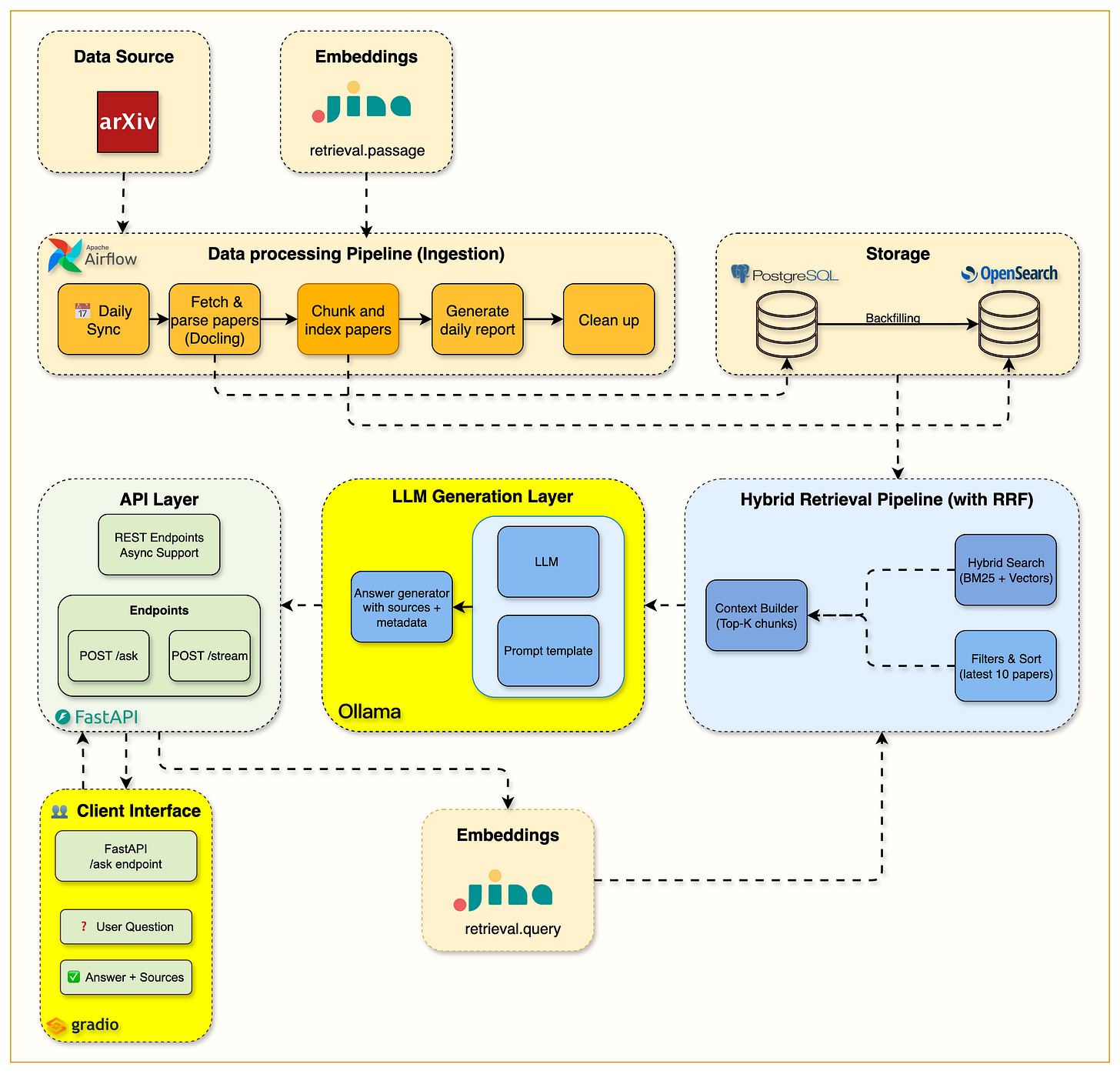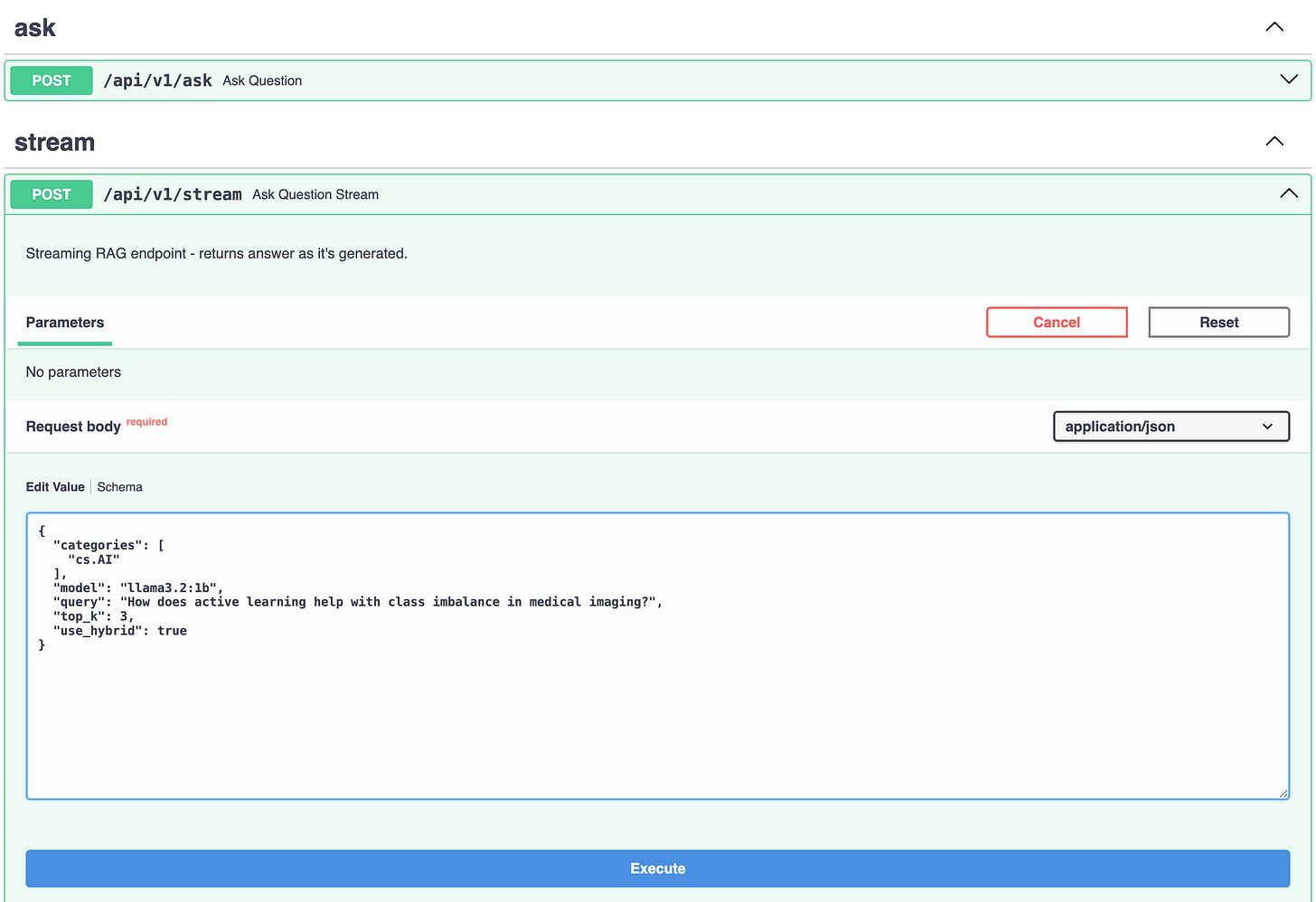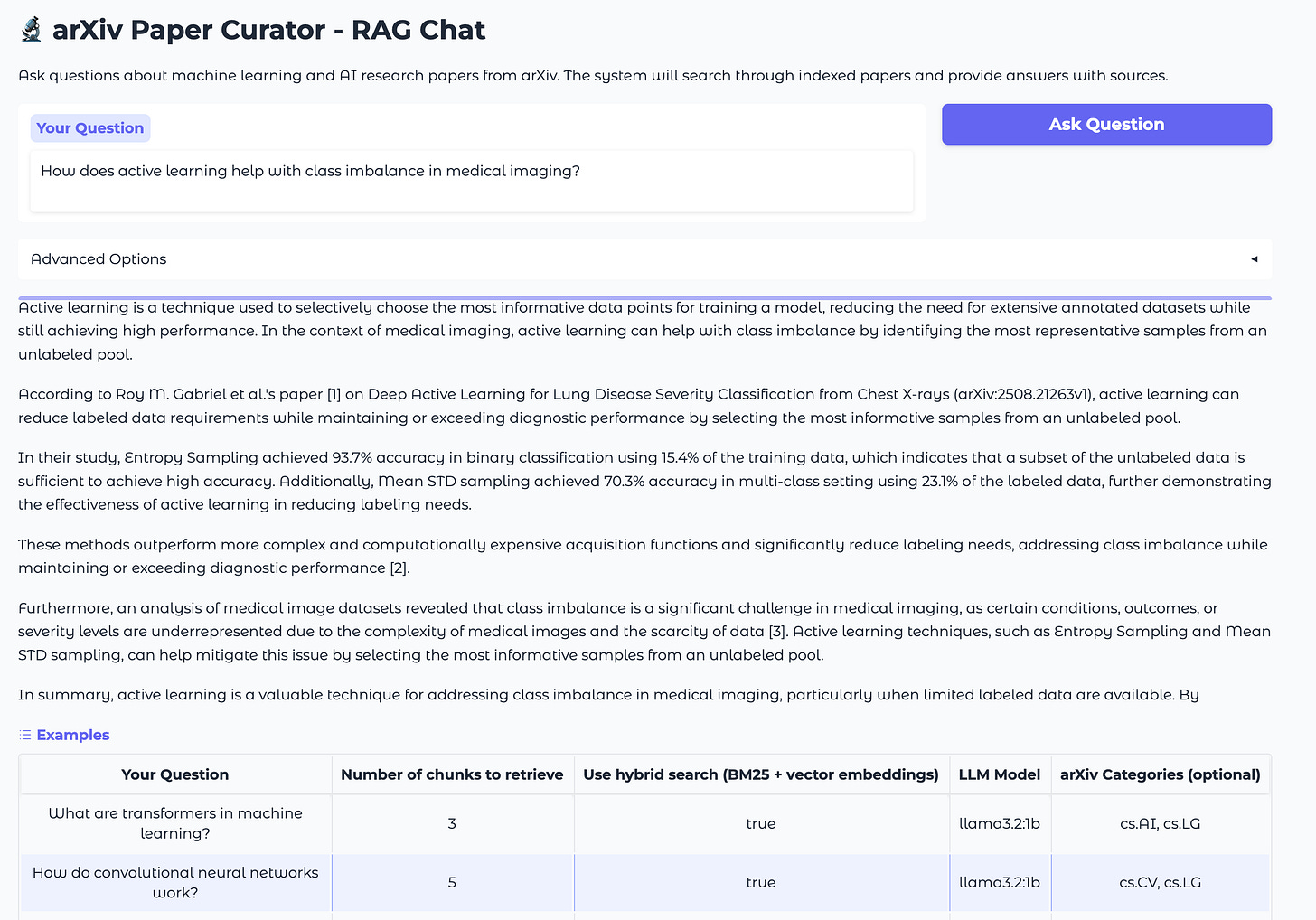The Complete RAG System
Mother of AI Project, Phase 1: Week 5
Hey there 👋,
Welcome to lesson five of "The Mother of AI" - Zero to RAG series!
Quick recap:
A strong RAG system is a chain: infra → data → search → generation.
Weeks 1–4 gave us solid infrastructure, live data pipeline, BM25 keyword search, and hybrid retrieval with semantic understanding. Now we complete the loop with LLM integration that delivers production-grade performance.
Most teams integrate LLMs and call it done. We won't. We'll implement smart prompt optimization, streaming responses for better UX, and a production-ready interface that actually works.
This week's goals
Integrate Ollama for local LLM inference with llama3.2 models
Optimize prompts with smart context reduction strategies
Implement streaming with Server-Sent Events for real-time responses
Build Gradio interface for interactive RAG system testing
Create production API with two focused endpoints for different use cases
Deliverables
Ollama service integration with automatic model management and health checks
Optimized prompt templates with minimal context for efficiency
Dual API design supporting both complete responses and streaming
Gradio web interface with real-time streaming and source citations
Production configuration with environment-based settings and error handling
Big picture: We took the hybrid search from Week 4 and connected it to local LLM inference, creating a complete RAG pipeline.
The key insight: removing redundant metadata and limiting response length delivers cleaner prompts without sacrificing answer quality.
The architecture now includes a complete generation layer: hybrid search retrieves relevant chunks, minimal prompts preserve context window, and Ollama generates focused answers with source citations.
What we built (high level)
Complete RAG system with LLM generation layer (Ollama), hybrid retrieval pipeline, and Gradio interface
LLM Generation Layer: Ollama service running llama3.2 models locally for privacy and control
Optimized Prompt Pipeline: Context builder selecting top-K chunks with minimal overhead
Streaming Architecture: Real-time token generation via Server-Sent Events
Interactive Interface: Gradio app for testing queries with live streaming
Production API: Two endpoints optimized for different use cases
What goes into the LLM
We send minimal, focused chunks to the LLM:
# Each chunk contains only what's necessary
chunk = {
"arxiv_id": "1706.03762", # For citations
"chunk_text": "The actual relevant content from the paper..."
}This could be extended or updated as per use case :)
The LLM receives:
The user's question
Top-K relevant chunks (typically 3)
A clear system prompt with instructions
No redundant metadata or unnecessary information
This clean approach ensures the LLM focuses on answering the question using the provided content rather than processing irrelevant metadata.
The dual API design
Not every use case needs the same response pattern. We built two endpoints optimized for different scenarios:
Standard RAG endpoint (/api/v1/ask)
Perfect for API integrations, batch processing, and when you need complete responses with metadata:
@ask_router.post("/ask", response_model=AskResponse)
async def ask_question(
request: AskRequest,
opensearch_client: OpenSearchDep,
embeddings_service: EmbeddingsDep,
ollama_client: OllamaDep,
) -> AskResponse:
"""
Complete RAG response with sources and metadata.
"""
chunks, sources, search_mode = await _prepare_chunks_and_sources(
request, opensearch_client, embeddings_service
)
response = await ollama_client.generate_rag_response(
query=request.query,
chunks=chunks,
model=request.model
)
return AskResponse(
query=request.query,
answer=response["answer"],
sources=sources,
confidence=response["confidence"],
search_mode=search_mode
)Streaming endpoint (/api/v1/stream)
Built for interactive UIs where time-to-first-token matters more than complete responses:
@stream_router.post("/stream")
async def stream_question(
request: AskRequest,
opensearch_client: OpenSearchDep,
embeddings_service: EmbeddingsDep,
ollama_client: OllamaDep,
):
"""
Stream RAG response via Server-Sent Events.
Provides real-time token generation
"""
async def generate():
# Send metadata immediately
yield f"data: {json.dumps({'sources': sources})}\n\n"
# Stream tokens as they arrive
async for token in ollama_client.generate_rag_stream(
query=request.query,
chunks=chunks,
model=request.model
):
yield f"data: {json.dumps({'token': token})}\n\n"
return StreamingResponse(
generate(),
media_type="text/event-stream"
)Real-world example:
Let's trace a query through the complete system:
1. Query arrives at API
{
"query": "How does active learning help with class imbalance in medical imaging?",
"top_k": 3,
"use_hybrid": true,
"model": "llama3.2:1b",
"categories": ["cs.AI"]
}2. Hybrid search retrieves chunks
BM25 finds: Papers with exact term "transformers"
Vector search finds: Papers about attention mechanisms, self-attention
RRF fusion: Combines both for best results
3. Minimal context preparation
chunks = [
{
"arxiv_id": "2408.15231",
"chunk_text": "Deep Active Learning for Lung Disease Severity
Classification addresses the challenge of
with limited labeled data. Our approach..."
},
{
"arxiv_id": "2408.15231",
"chunk_text": "To handle severe class imbalance in lung disease
datasets, we employ a combination..."
},
{
"arxiv_id": "2107.03463",
"chunk_text": "Active learning in medical imaging reduces
burden by iteratively selecting ..."
}
4. Prompt template construction
The system creates a focused prompt by combining:
# System prompt (from rag_system.txt)
system_prompt = """You are an AI assistant specialized in answering questions about
academic papers from arXiv. Base your answer STRICTLY on the provided paper excerpts.
LIMIT YOUR RESPONSE TO 300 WORDS MAXIMUM."""
# Context from chunks
context = """### Context from Papers:
[1. arXiv:2408.15231]
Deep Active Learning for Lung Disease Severity Classification addresses the challenge...
[2. arXiv:2408.15231]
To handle severe class imbalance in lung disease datasets, we employ a combination...
[3. arXiv:2107.03463]
Active learning in medical imaging reduces annotation burden by iteratively selecting..."""
# User question
question = "How does active learning help with class imbalance in medical imaging?"
# Final prompt sent to Ollama
final_prompt = f"{system_prompt}\n\n{context}\n\n### Question:\n{question}\n\n### Answer (cite sources using [arXiv:id] format):"
The clean, structured prompt ensures the LLM focuses on the relevant content without distractions.
5. LLM generates response
Active learning helps address class imbalance in medical imaging through
strategic sample selection and efficient use of limited annotations.
In the context of lung disease classification from chest X-rays
(arXiv:2408.15231), active learning reduces labeling requirements by 60%
while maintaining diagnostic accuracy. The approach uses uncertainty
sampling to identify the most....6. Response includes sources
{
"answer": "[above text]",
"sources": [
"https://arxiv.org/pdf/2408.15231.pdf",
"https://arxiv.org/pdf/2107.03463.pdf"
],
"confidence": "high",
"search_mode": "hybrid"
}The Gradio interface
We built an interactive web UI that makes testing and demonstrating the RAG system effortless:
# gradio_launcher.py
import gradio as gr
from src.gradio_app import create_interface
if __name__ == "__main__":
interface = create_interface()
interface.launch(
server_name="0.0.0.0",
server_port=7861,
share=False
)Features:
Real-time streaming: See tokens appear as they're generated
Source citations: Click to open PDF sources
Search mode toggle: Compare BM25 vs hybrid results
Category filtering: Focus on specific arXiv categories
Response timing: Track performance for different configurations
Access it at http://localhost:7861 after running:
uv run python gradio_launcher.py
Building on weeks 1-4
Our complete RAG system seamlessly integrates everything we've built:
Week 1 infrastructure: Docker containers now include Ollama service
Week 2 data pipeline: Papers flow automatically into searchable chunks
Week 3 BM25 search: Forms the keyword component of retrieval
Week 4 hybrid search: Provides semantic understanding for better results
Week 5 generation: Completes the loop with optimized LLM responses
The compound effect: Because we built proper abstractions from the start, adding LLM generation was mostly about optimization and interface design, not complex integration work.
Production configuration
Model selection based on hardware:
ModelRAM RequiredQualityUse Casellama3.2:1b2GBGoodDefault, demosllama3.2:3b4GBBetterProductionphi3:mini2GBGoodAlternativemistral:7b8GBBestHigh quality
Environment configuration:
# .env
OLLAMA_HOST=http://ollama:11434
OLLAMA__DEFAULT_MODEL=llama3.2:1b
OLLAMA__TIMEOUT=120
OLLAMA__MAX_TOKENS=300
# Performance tuning
OPENSEARCH__MAX_TEXT_SIZE=1000000
RAG__TOP_K_DEFAULT=3
RAG__USE_HYBRID_DEFAULT=true
Docker resource allocation:
# docker-compose.yml
ollama:
image: ollama/ollama:latest
deploy:
resources:
limits:
memory: 4G
reservations:
memory: 2G
Configuration options
We tested various configurations to find the sweet spot.
Key findings:
top_k=3provides the best balance of context and qualityHybrid search significantly improves relevance
Streaming improves perceived responsiveness
Always best to use streaming for Time to first token
Code and resources
📓 Code location: https://github.com/jamwithai/arxiv-paper-curator
📓 Interactive Tutorial: notebooks/week5/week5_complete_rag_system.ipynb
Complete walkthrough of the RAG pipeline
Performance comparisons between configurations
Troubleshooting guide for common issues
Examples with real arXiv papers
📁 Key Files:
src/routers/ask.py- RAG API endpoints (standard and streaming)src/services/ollama/client.py- Ollama integration with streamingsrc/services/ollama/prompts/- Optimized prompt templatessrc/gradio_app.py- Interactive web interfacegradio_launcher.py- Simple launcher script
📚 Documentation:
Week 5 README: notebooks/week5/README.md
API Documentation: http://localhost:8000/docs
Gradio Interface: http://localhost:7861
Previous weeks:
Week 2: Bringing Your RAG System to Life
Verifying everything works
Prerequisites:
Start services:
docker compose up --build -dPull LLM model:
docker exec rag-ollama ollama pull llama3.2:1bSet embeddings key: Add JINA_API_KEY to .env (get free at https://jina.ai/embeddings/)
Run ingestion: Trigger Airflow DAG to populate data
Testing the implementation
Want to see it all in action? Three ways to test:
1. API Testing
# Standard endpoint
curl -X POST "http://localhost:8000/api/v1/ask" \
-H "Content-Type: application/json" \
-d '{"query": "What are transformers?", "top_k": 3}'
# Streaming endpoint
curl -X POST "http://localhost:8000/api/v1/stream" \
-H "Content-Type: application/json" \
-d '{"query": "Explain attention mechanism", "top_k": 2}' \
--no-buffer2. Gradio Interface
uv run python gradio_launcher.py
# Open http://localhost:78613. Interactive Notebook
uv run jupyter notebook notebooks/week5/week5_complete_rag_system.ipynbThe notebook includes:
Complete setup verification with health checks
Step-by-step testing of RAG pipeline
Performance comparisons across different configurations
Streaming vs standard endpoint
Real examples with actual papers
What's next (Week 6)
Next week we add the finishing touches for production deployment:
Langfuse integration for complete observability
Request tracing from question to answer
Caching layer for common queries
Production deployment configurations
Follow Along: This is Week 5 of 6 in our Zero to RAG series. Every Thursday, we release new content, code, and notebooks.
Let's go 💪







How are you checking for hallucinations?
Wait all of this was actually built? I have ollama. Is the link above where I start to try and rebuild myself? Or is the start somewhere else?